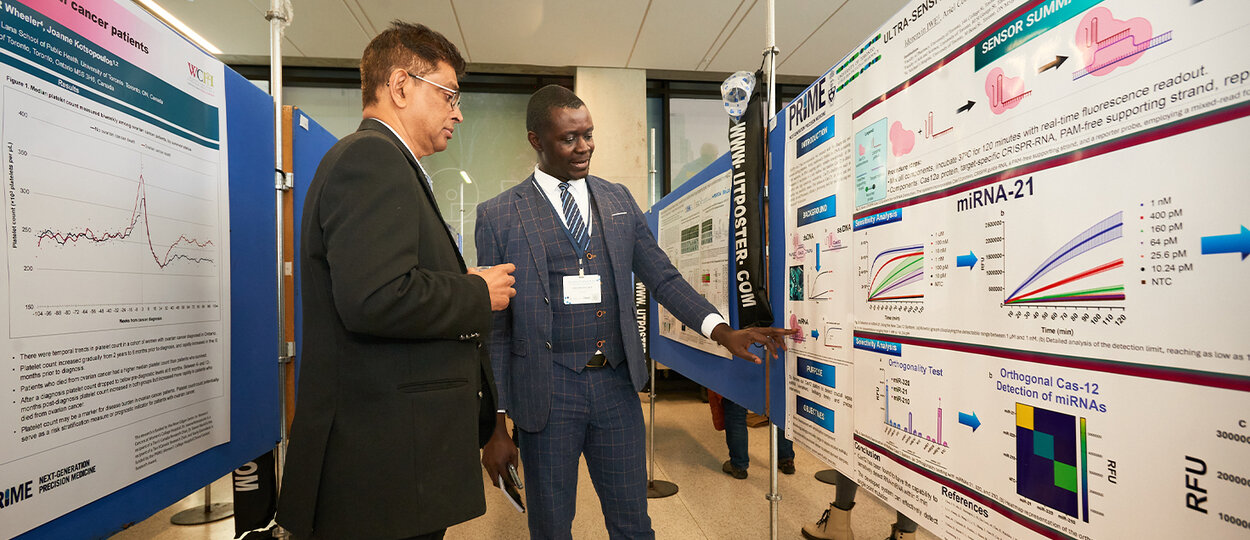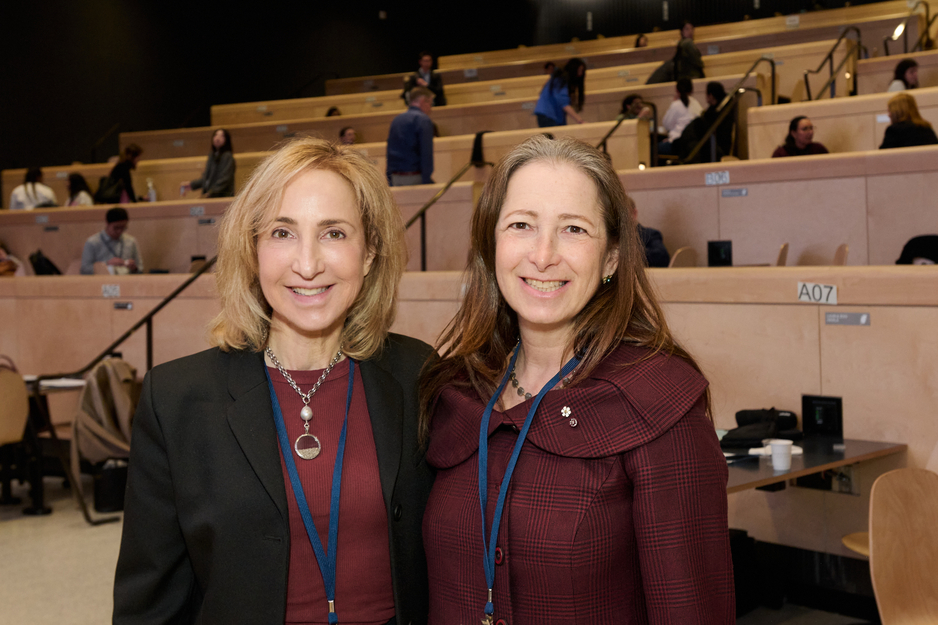With U of T as a hub of world-class precision medicine research, hundreds of researchers and clinicians from U of T, its affiliated hospitals, and industry gathered for the fifth annual PRiME symposium held on February 20 at the Myhal Centre for Engineering Innovation and Entrepreneurship.
The symposium, “New Frontiers in Precision Medicine: Unleashing the Potential,” featured an exciting line-up of speakers from academia and industry representing a wide range of precision medicine research.
“In-person symposia like PRiME’s are valuable not just for the seminars but all of the discussion that follows – in the hallways, over lunch, at the poster session. As shared information percolates, we have the opportunity to dive deeper, reflect and engage in more discussion,” says Molly Shoichet, scientific director of PRiME and Michael E. Charles Professor of Chemical Engineering. “PRiME 2024 brought scientists, engineers and clinicians in academia together with those in industry and government organizations. To really make a difference in human health, we all have to work together with patients.”
“PRiME 2024 brought scientists, engineers and clinicians in academia together with those in industry and government organizations. To really make a difference in human health, we all have to work together with patients.”
The PRiME Next-Generation Precision Medicine strategic initiative at U of T brings together scientists and innovators from across faculties to accelerate research in drug discovery, diagnostics and disease biology. Founded in 2019, PRiME now has a renewed vision to advance the leading-edge research from its member scientists to impact patients through collaborations with hospital partners.
Speakers from across U of T and affiliated hospitals presented their cutting-edge research on a range of topics such as developing screening technology to look for targeted cancer treatments and personalized therapies for stroke. Last year’s PRiME fellows – representing various U of T divisions including the Temerty Faculty of Medicine, Faculty of Arts and Science, Faculty of Applied Science and Engineering, and Leslie Dan Faculty of Pharmacy – also presented their interdisciplinary research in three-minute lightning-round talks. The PRiME fellowships are awarded to senior PhD candidates and postdoctoral fellows, and are intended to catalyze high-risk, high-reward projects that may otherwise be hard to fund. Additional trainees showcased their research projects in the event’s poster session.
With a wide range of speakers and attendees, the symposium offered a stimulating environment for attendees to network and learn.
“This is a great opportunity to increase my contacts with industry and other labs,” says Meysam Khosravi-Farsani, a postdoctoral fellow working with Professor Raymond Reilly in the Centre for Pharmaceutical Oncology at U of T to develop imaging and therapeutic technologies for head and neck cancer. “I like the environment of the symposium with so many other labs here and a wide variation in the talks.”
Symposium speakers highlight importance of collaboration
The symposium’s highlights included keynote presentations from leaders in academia and industry who shared key insights on the importance of interdisciplinary collaboration.
Nevan Krogan, professor and director of the Quantitative Biosciences Institute at the University of California San Francisco, gave the scientific keynote on his research to understand disease mechanisms by examining networks of interacting proteins – as well as the importance of “people-people interactions” in conducting the work.
He spoke specifically about his work to map the protein-protein interactions of all genes implicated in psychiatric diseases such as autism spectrum disorder and how these interactions change with genetic mutations. This strategy gives a deeper understanding of disease mechanisms and may identify new therapeutic targets – an approach to drug discovery based on genetic mutations and precision medicine.
In the industry keynote, Amber Salzman, CEO of Epic Bio, shared her personal experience in both patient advocacy and the pharmaceutical industry in navigating the challenges of developing innovative therapies for rare diseases. Lack of knowledge about disease biology and small patient populations for clinical trials are known barriers scientists are grappling with, Salzman said.
Throughout her talk, Salzman emphasized the importance of collaboration – with patients, regulators, and other researchers – to advancing knowledge and overcoming those challenges.
Salzman also participated in a panel discussion with other leaders from Novartis, Moderna, Amplitude Ventures, and Recursion, focused on disruptive technologies in next-generation therapeutics. The panel was moderated by Paul Santerre, professor at the Institute of Biomedical Engineering and director of the Health Innovation Hub (H2i), a campus-linked accelerator housed at the Temerty Faculty of Medicine.
Panelists discussed the challenges and complexities of developing precision medicines – from development and manufacturing to clinical trials and patient access – and the system-wide changes that will be needed to advance new precision medicines.
The day concluded with the announcement of 10 new PRiME fellows conducting interdisciplinary projects in collaboration with partner hospitals.
Trainees and researchers from the Leslie Dan Faculty was well-represented at the PRiME symposium. Assistant Professor Hagar Labouta and Associate Professor Keith Pardee presented their research, postdoctoral fellows Meysam Khosravi-Farsani and Yue Xu gave lightning-round talks, and Idorenyin IWE was awarded one of the 2024 PRiME fellowships. Several other trainees participated in the poster session.
Shoichet says the symposium provided many highlights and showcased the strength of U of T’s research community.
“The lightning talks by our PRiME fellows, the keynote speakers, and everyone in between brought forward great ideas and enhanced my understanding of the richness, breadth and strength of precision medicine in Toronto,” she says.
The symposium was sponsored by Novartis, Toronto Innovation Acceleration Partners, adMare Bioinnovations and Moderna.
More News
Image

Dean Lisa Dolovich reappointed for second term
Professor Lisa Dolovich has been reappointed for a second term as Dean of the Leslie Dan Faculty of Pharmacy, University of Toronto, effective July 1, 2025, to December 30, 2030.
Read More
Image

Pharmacy Summer Camp gives high school students insight into pharmacy profession
A new summer camp based at the faculty will give high school students a range of experiences in pharmacy and pharmaceutical sciences.
Read More
Image

Team GloveLift wins 2025 Business Plan Competition with innovative medical device
PharmD students win $5,000 prize for their innovative medical device concept aimed at improving patient care.
Read More

